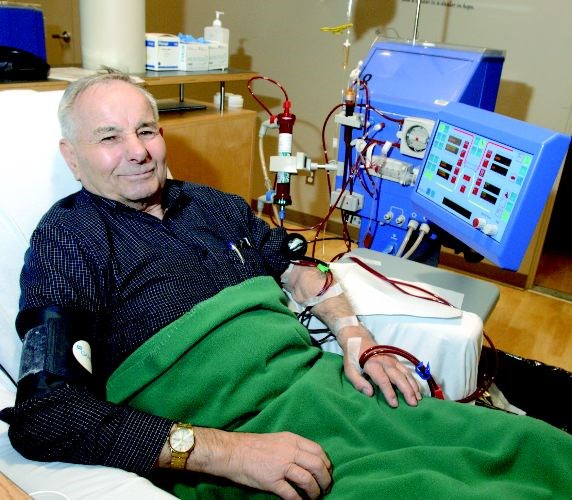On Nov. 17, Steve Marynovich will mark his sixth anniversary as a hemodialysis patient.
When he drops by the Northern Independent Dialysis Unit at Parkwood Mall that day, there won't be any party balloons or a big cake to mark the occasion, just the smiling face of a familiar nurse and the friendly company of his peers lying beside him while they have the impurities filtered out of their blood.
That familiarity with staff and patients and the relaxed atmosphere of the clinic makes each four-hour session in dialysis less of chore for Marynovich. At 81, he faces the reality of being hooked up to a machine for at least four hours every day, three days per week for the rest of his life.
For the first three years after his kidneys failed, Marynovich went to the hospital for dialysis, an operation that always left him fumbling for change.
"It's such an improvement here, you don't have to look for a parking spot or have the right change, and it's more relaxed here than at the hospital," said Marynovich, while undergoing dialysis Wednesday morning at the independent clinic. "I've got three wonderful nurses here. Not only are they great nurses, it's the kindness they show. At the hospital it's different nurses all the time and they don't get to know you like these three or four. It's far better here."
At the clinic, Marynovich does everything except insert the needles into his arm. He starts by inputting his own prescribed settings into a machine that controls the release of chemicals and purified water that make up the dialysate, which filters impurities to replace his lost kidney function. During dialysis, he records blood pressure and blood flow, and monitors the amount of his own fluids that get filtered out of his blood.
"I have a bit of shaky right hand so I don't put the needles in, but I do the rest," said Marynovich.
Half of the clinic's 12 patients administer their own needles, usually through a fistula, a vein and artery that have been surgically stitched together to create easier access for two dialysis tubes.
The independent unit opened in May 2008, the first of its kind in B.C., pioneering a new means of delivering hemodialysis to patients willing and able to make the transition to more self-administered treatment.
The clinic is open 7 a.m. to 7 p.m., six days per week, offering six beds and two training rooms. Nurses work 12-hour shifts and the patient-nurse ratio is six-to-one, as opposed to a hospital setting, where it more like three patients for every nurse. That saves health care dollars.
The independent clinic is the offshoot of a conversation between Laurie Ledger, the regional renal manager for Northern Health, and Angie Robinson, a home hemodialysis educator. At the time, the in-centre dialysis clinic at the hospital was being crowded out by other kinds of patients.
"We give them back that control that is taken away in a hospital setting," said Robinson.
In northern B.C., hemodialysis is available only in Prince George, Terrace and Fort St. John. That's why it's critical to encourage more dialysis patients, especially those in outlying areas, to try self-administered home care.
"This is the second-best option for patients who can't do this at home," Robinson said.
"The more you dialysize the better it is for you. Patients here are limited to three or maybe four times a week.
"If they can dialysize at home you see the best lifestyle and health benefits, but that's not a reality for a lot of patients."
Taking the clinic out of the hospital was a key transitional step.
"I love my job," said Robinson, one of three full-time nurses at the clinic. "I see how we impact the lives of patients in a positive way. We develop relationships with patients and we see them flourish and they give us back what we've given them, so we feel appreciated."
The success of the Northern Health initiative has encouraged other health regions in the province to consider establishing similar independent dialysis clinics to expand services in their jurisdictions. Martin Duffy of the Fraser Valley Authority is one of three hemodialysis educators from the Lower Mainland taking part in a three-day training course this week at the Prince George clinic.
"This facility is excellent, everything is proactive and very patient-centred," said Duffy. "It gives patients autonomy and choices and it makes a lot more sense for almost every possible reason. It's better for the medics and the patients and it helps the health service be a lot more cost-effective.
"In the Fraser Valley, only two per cent of hemodialysis patients are independent and we're aiming to get it more than 10 per cent. This type of setup is what we're aiming for."



